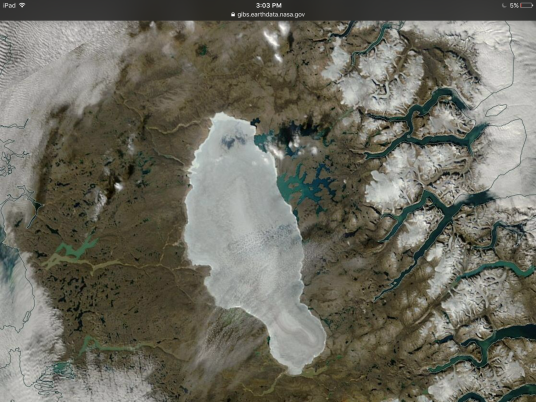Arctic Entering Its Hottest Period in 2.5 Million Years as Last Remnants of Laurentide Melt Away
“This is the disappearance of a feature from the last glacial age, which would have probably survived without anthropogenic greenhouse gas emissions.” — Adrien Gilbert
*****
There are many ways to tell the Earth’s temperature. One is by measuring how warm the atmosphere is near the surface. Another is to track the heat content of the world’s oceans. Still another is by taking account of melting glaciers and comparing thaw lines with times in the geological past.
And according to new research, the present state of the Barnes Ice Cap — which is the last tiny remnant of the once vast Laurentide Ice Sheet — tells a tale of heat not seen in 2.5 million years.
(NASA satellite shot of the last melting remnant of the Laurentide Ice sheet on August 30 of 2016. Want to see a time lapse of Barnes Ice Cap melt from 1984 to 2015? Take a look at this GoogleEarth time lapse, zoom in on Baffin Island, find the ice cap, and watch the edge lines retreat. It’s a bit uncanny..)
Over the past 2.5 million years, the Laurentide Ice Sheet has swelled and shrunken as cold ice ages were followed by warm interglacials. During the height of each ice age, the glaciers of Laurentide expanded to cover most of present day Canada and parts of the Northern United States. And during warmer interglacials, the ice sheet retreated to its final stronghold of the Barnes Ice Cap on Baffin Island.
But now, scientists have found that the Barnes Ice Cap, and with it the last remains of the Laurentide Ice Sheet, is about to disappear. Projections indicate that the considerable warming the Arctic is now experiencing, due primarily to fossil fuel burning, will completely melt this half-a-kilometer tall mountain of ice in just 200 to 500 years.
Once that happens, the Laurentide Ice Sheet will be gone. And this will be the first time such a thing has happened in 2.5 million years.
(Recent decline of the Laurentide Ice Sheet during the end of the last ice age to 1,000 years before present. Soon, this once great mass of ice will be completely lost. Yet one more casualty of human fossil fuel burning.)
Though the Barnes Ice Cap may now be rather small compared to the larger ice masses of Greenland and Antarctica, its melt serves as a further sign that glaciers in those regions are also at risk. Gifford Miller, the associate director of CU Boulder’s Institute of Arctic and Alpine Research who has conducted research on Baffin Island for many decades notes:
“I think the disappearance of the Barnes Ice Cap would be just a scientific curiosity if it were not so unusual. One implication derived from our results is that significant parts of the southern Greenland Ice Sheet also may be at risk of melting as the Arctic continues to warm.”
Which is why many researchers are now saying that the imminent loss of Barnes serves as a kind of glacial melt canary in a coal mine.
The study authors further note that even if fossil fuel burning were to stop now, the total loss of the Barnes Ice Cap would still occur. What this means is that some parts of the Arctic are now likely as hot or hotter than they were at any time in the last 2.5 million years — the time when Barnes first formed. And, as the World Meteorological Organization noted so cogently this week, it also means that we’re heading deeper and deeper into an uncharted climate.
(UPDATED)
Links:
Hat tip to Colorado Bob
Hat tip to Keith Antonysen
Hat tip to Kevin





Geen opmerkingen:
Een reactie posten